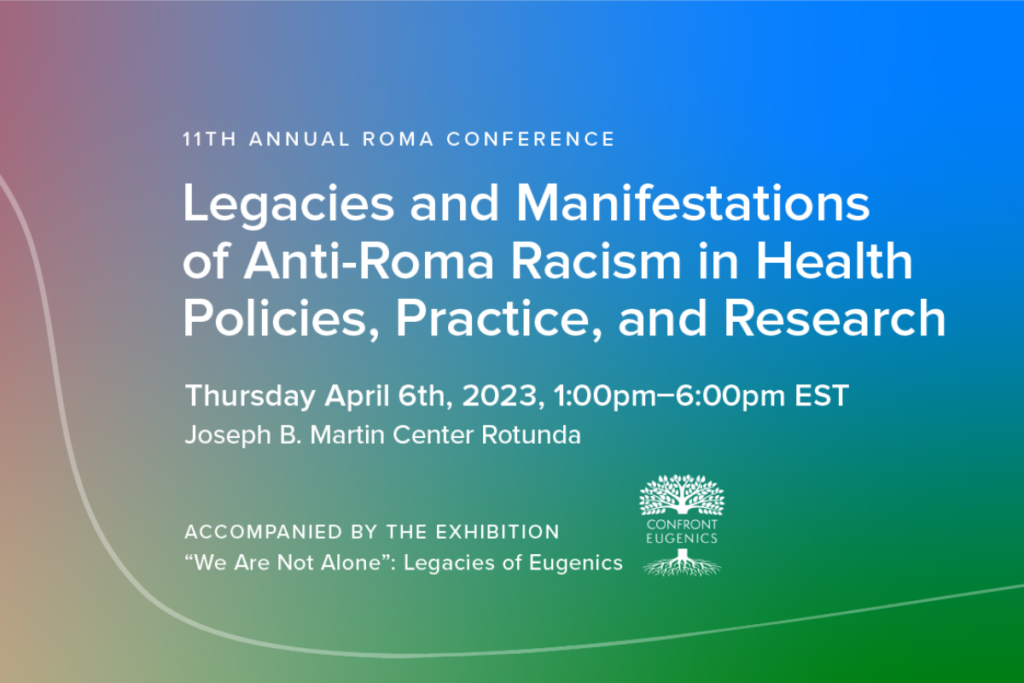
- This event has passed.
Legacies and Manifestations of Anti-Roma Racism in Health Policies, Practice, and Research
April 6th, 2023 @ 1:00 pm - 6:00 pm

In partnership with the Department of Social and Behavioral Sciences, Harvard Chan School of Public Health, the Charles Warren Center for Studies in American History at Harvard University, the Romani Studies Program at Central European University, the Center on Forced Displacement at Boston University, and the Centre for Medical Humanities at Oxford Brookes University, the Roma Program at the FXB Center for Health and Human Rights will host a free, in-person conference at Harvard University’s Martin Center. This constitutes the Roma Program’s 11th Roma conference marking the annual International Roma Day which is celebrated worldwide every April 8th. This April 8th, we mark the 52nd anniversary of the First World Roma Congress. For more information about International Roma Day, click here.
The conference will take place at the Martin Center’s third-floor rotunda located at 77 Avenue Louis Pasteur, Boston, MA, 02115. The Martin Center is accessible by public transportation and near several garages, but there is no parking on site. Information on traveling to the Center is available here. A reception will follow.
Register here.
Many sociological and anthropological studies document disparities in health outcomes for Roma people and their non-Roma neighbors. Scholars often propose social and economic factors, cultural differences, behaviors, and “lifestyle” as causes of disease and inequities. But comprehensive scholarship on how structural racism has shaped Roma’s health and health inequities between Roma and non-Roma is scarce. Little has been done to understand the historical underpinnings of inequities and the legacies of slavery, G*psy hunts, forced imprisonment, genocides, or forced assimilation. For instance, a significant number of Roma families and communities across Europe live in poorly resourced and residentially segregated neighborhoods, a legacy of both past and present anti-Roma measures. Yet, only a few studies, such as the 2022 Enhojust report, have documented the nexus between residential segregation, environmental racism, and poor health outcomes.
In light of such shortcomings, the Roma Program is launching an initiative that focuses on documenting structural anti-Roma racism and its health-related impacts in Europe and other parts of the globe. The goal is to build a robust knowledge base and fill gaps in content and research methodology while ensuring that the efforts undertaken are responsive to community needs and inform policymaking. Accordingly, this annual Roma conference aims to initiate a series of conversations and research efforts on anti-Roma racism as a structural determinant of health inequalities and as a health stressor in itself in order to improve data, research methods, and practice-oriented research and inform policy design.
Questions to be addressed during the conference:
- How do we assess and address the impact of anti-Roma racism on the health and well-being of the Roma people?
- Can we use or adjust existing theories (e.g., the ecosocial theory of disease distribution) and measures (e.g., everyday discrimination scale ) to probe a potential causal relationship between structural anti-Roma racism and health inequities?
- How do we catalog, measure, and quantify the acute, chronic, and traumatic dimensions of anti-Roma racism?
- How do we prevent and combat the use of cultural determinism in justifying or explaining health inequities and negative health outcomes?
- How do we combat the eugenic de-humanization of the Roma?
- How do we create a shared sense of solidarity in confronting racism in health at a global level?


